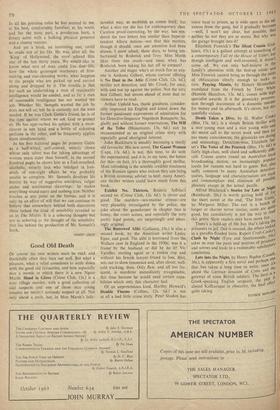Good Old Death
OF course the new writers must be read, and thankfully often they turn out well. But what a pleasure, what a relief sometimes to settle down with the good old favourites, and how especially nice a month in which there is a new Ngaio Marsh. Hand in Glove (Crime Club, 15s.) is a cosy village murder, with a good collection of odd suspects and one of those nice young couples we needn't seriously suspect at all. Not only about a snob, but, in Miss Marsh's lady-
novelist way, as snobbish as comes itself; but what a nice ear she has for contemporary chat. Careless proof-correcting, by the way, has ren- dered the two letters less similar than Superin- tendent Alleyn notices—not that this matters, though it should, once our attention had been drawn. I must admit, these days, to being em- barrassed by Roderick and Troy. Miss Marsh likes them too much—and since when has Roderick been taking his hat off to corpses?
Another old stager who's as much fun as any- one is Anthony Gilbert, whose current offering is No Dust in the Attic (Crime Club, 12s. 6d.), thriller not detection, and Mr. Crook, for once, with and not up against the police. Not the very best Gilbert, but streets ahead of most that re- viewers have to read.
Arthur Upfleld has, thank goodness, consider- ably improved his English and toned down the former passionate expressions of admiration for his Detective-Inspector Napoleon Bonaparte. So, gladly and without former reservations, The Will of the Tribe (Heinemann, 13s. -6d.) can be recommended as an original crime story with especially good aboriginal interest.
John Blackburn is steadily becoming a sturdy old favourite. His new novel, The Gaunt Woman (Cape, 13s. 6d.), is not, this time, to do with the supernatural, and it is, to my taste, the better for this—in fact, it's a thoroughly good thriller. Most refreshing is the sensible credible treatment of the Russian agents who reckon they can bring a British economic adviser to heel; many Ameri- can thriller writers could learn much from this book.
Exhibit No. Thirteen, Roderic Jeffries's second tee (Crime Club, 12s. 6d.), is clever and good. The murders—sex-maniac crimes—are very plausibly investigated by the police, the joke about the gamekeeper in chapter two is funny, the court scenes, and especially the very pretty legal points, are surprisingly and pleas- ingly original.
The Borrowed Alibi (Gollancz, 15s.) is also a second book, by the American writer Lesley Egan, and good. The alibi is borrowed from the» Wallace case in England in the 1930s; was it a frame' by the husband or- did he do it? Vic Varalho, starting again as a rookie cop and without his Jewish lawyer friend (a loss, this), sets out to show innocence and, after clever, well- told tracking, does. Only flaw, and all too fre- quent, is murderer immediately recognisable, this time because he would need certain capa-
bilities which only this character had. '
Of an unpretentious kind, Hartley Howard's Double Finesse (Collins, 12s. 6d.) is not at all a bad little crime story. Peter Shedon has
twice been to prison, so is wide open to the ad- vances from the gang, but it gradually becomes —well, I won't say clear, but possible, that
- neither he nor they are as seems. But why was the garage brought into it?
Elizabeth Fenwick's The Silent Cousin (031; lancz, 15s.) is a gallant attempt at something of a contemporary Fall of the House of Usher, but though intelligent and well-invented, it doesn't come off. We can only half-believe in the family's obsession with the tied-up estate and Miss Fenwick cannot bring us through the mists of obfuscation clearly enough to make Lis care. Praying Mantis, by Hubert Monteilhet, translated from the French by Tony White (Hamish Hamilton, 13s. 6d.), comes with .11igu specialist awards. It is the gimmicky presenta- tion through documents of a domestic murder for money and its aftermath. It's clever, but dis- tastefully vicious. Death Takes a Dive, by G. Walter Cooke (Bles, 13s. 6d.), is a simple British thriller with a nice young man and a nice young wife. and the secret call to the secret work and then far , too many coincidences; the gimmicks are diving and scientology. Detection-wise, Elizabeth Sal- ter's The Voice of the Peacock (Bles, 13s. 6d.) is fairly high-class, well clued and sufficiently diffi- cult. Crimes centre round an Australian local broadcasting station, an increasingly popular locale for reasons not hard to guess. But, also sadly common to many Australian detective- stories, language and characterisation are slack and commonplace and eliminate all possible pleasure except in the actual puzzle. Alfred Hitchcock's Stories for Late at Night (Reinhardt, 20s.) is worth getting hold of for the short novel at the end, 'The Iron Gates', by Margaret Millar. The rest is a bunch O' longer or shorter terror stories; some are quite good, but cumulatively is not the way to read this genre. Slow readers may have more fun. ,e There's a hold-up of the bus that's taking tl'A prisoners to jail. One is rescued, the others locked in a paraffin-flooded barn. Rupert Croft-Cooke; Clash by Night (Eyre and Spottiswoode, 16s: takes us over the pasts and motives of prisoile", and screws and leads to a reasonably satisfactory conclusion. Cassell, Late into the Night, by Henry Bigden (Ca nn I6s.), is apparently a first novel and perhaPs that has taken a long time to write, since 1;: about the German invasion of Crete and .the
; getaway of some British soldiers. The hero, is Greek-speaking English sergeant, the plot is almost Kafkaesque in obscurity, the final effect
ESTHER HOwh






































 Previous page
Previous page